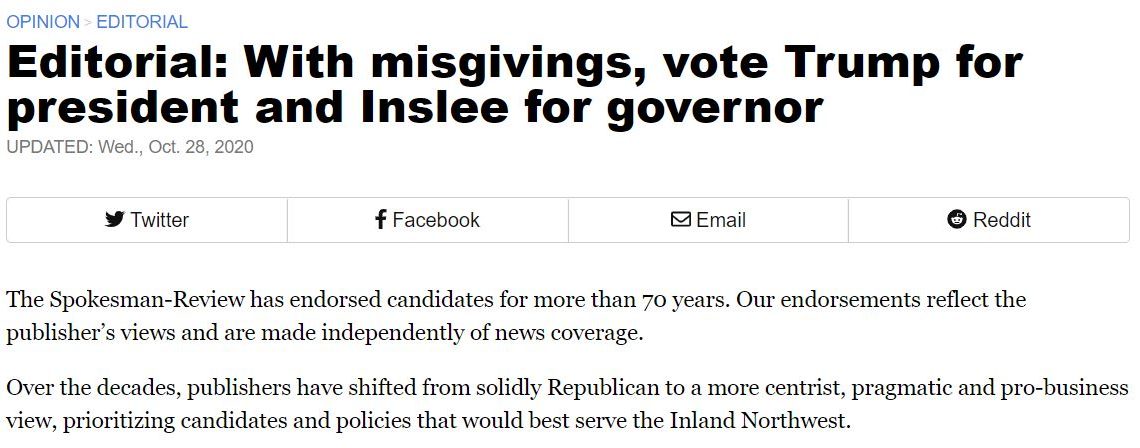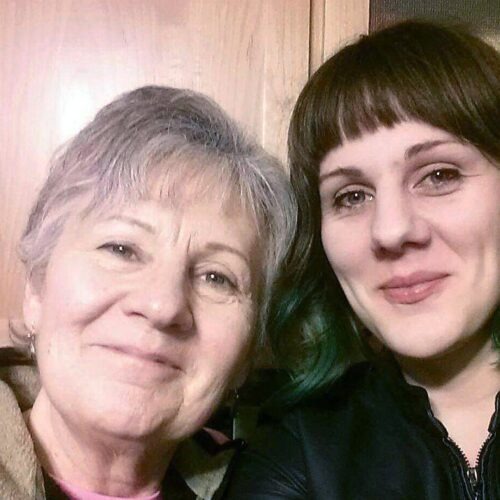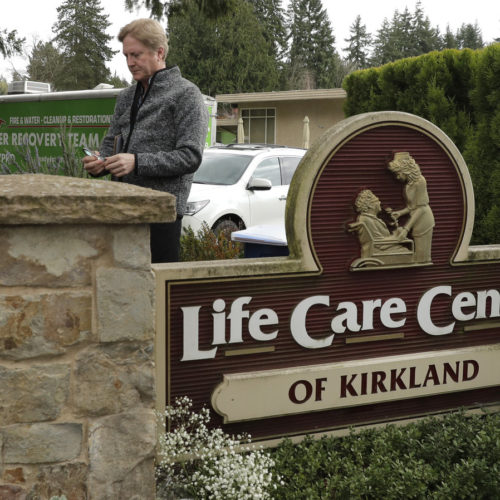
Newspaper’s Trump-Inslee Editorial Prompts The Question: Do Endorsements Matter In 2020?
WATCH
The Spokesman-Review newspaper recently caused a splash when it endorsed Donald Trump for president after calling him a bully and a bigot. The paper also endorsed Democrat Jay Inslee for a third term as Washington governor.
But that was just the view of one person: the newspaper’s longtime owner and publisher, Stacey Cowles.
Matt Hall (Twitter: @sduncovered) is the president of the national Society of Professional Journalists and editorial-opinion director for the San Diego Union-Tribune. He says editorial boards making informed endorsements are a good thing. But he also says news outlets shouldn’t have boards made up solely of the owner or publisher. (Related: learn more about the SPJ Code of Ethics.)
“That’s unhealthy. I think we can all agree that it’s more democratic, small ‘D,’ to have everyone in a room talking about what makes a stronger community than people coming down from the mountaintop with stone tablets, which is what newspapers really were,” Hall said on NWPB’s Uniquely NW News TV program. “And that’s honestly why newspaper subscriptions and audience is declining, because those were largely the purview of old white men and now the community needs to be broader and needs to be listened to, and so a more inclusive approach is smarter. An editorial board of one is a bad idea, and it always has been.”
After backlash, the Spokesman-Review’s editor-in-chief, Rob Curley, said the paper would no longer endorse candidates or run unsigned editorials.
(Learn more about the Society of Professional Journalists’ Code of Ethics.)
Watch the full episode above. See more from NWPB’s Uniquely NW News and all NWPB videos on YouTube.
CONVERSATION HIGHLIGHTS:
(Edited for length and clarity)
On why newspapers endorsing candidates in 2020 is still a good idea:
What I try to tell people is that it’s not so much about the name, the end result, it’s about the process. And at the union Tribune, we are very upfront and transparent about our process and we involve our audience, right? So what an endorsement says and why I think they’re so important is that it’s a historical record. You can look back as we did in 2016 and find out that the Union-Tribune and its then-148-year history had never endorsed a Democrat for president. So when we endorsed Hillary Clinton at the time, we wanted our audience to know that, that we had done that research, that we were sharing our views and we did. And we set ourselves up to not just have people judge the choice, but to judge us. And I think in this day and age, when trust in media institutions is falling and leadership is declining, that we really need to involve our audiences. So that has been important to us, we ask what kind of questions we should ask our candidates, and it’s not so much the presidential endorsement that moves the needle, it is all the other endorsements down ballot.
On why outlets should still do endorsements even when they could make the jobs of the separate journalists in the newsroom more difficult from the perception of the general public:
I think it becomes a media literacy question. And this is a failing of journalism and going back decades. Journalists did a very very poor job if they even tried to explain what an editorial is, what a letter to the editor is, what a commentary is, what the standards for our unbiased newsroom are. And so at the interview, and we have a micro-site that says, our journalism’s explained, that talks about some of those differences and those distinctions, especially between opinion and news, it talks about how we use anonymous sources. It really tries to pull back the curtain, which I think all journalism outlets need to do. I think we, personally can do a better job of this, but you need to explain what an editorial board is. The beauty of an editorial board is that it is different from the newsroom. The journalists in the newsroom were not involved in our discussions or our decision-making, weren’t even involved in our interviews. And so it is entirely a group of six people who meet every day to write editorials and start a conversation or continue a conversation and my shop is not ending a conversation. We will print your letter to the editor if you disagree with our endorsements. That’s part of the process too.
On what newspapers like the Spokesman-Review and any other should do to make it clear that the owner/publisher making endorsements doesn’t represent the newsroom:
I think that one of the failures of The Spokesman-Review was using we, was calling itself a board when it’s really the publisher, right? So clearly there’s a long history in American journalism of the publisher being able to say whatever they want, that’s the publisher’s newspaper. That’s literally why some publishers own the newspaper. I’m very fortunate at the Union Tribune to be owned by Dr. Patrick Soon-Shiong, who owns the union Tribune and the LA times, and is fairly hands-off with our process. This year we explained that he was involved, he wanted to see some of the editorials that we wrote on a state and national level, and we explained that to our readers. And I think part of the process is explaining how these discussions unfold. It sounds like The Spokesman-Review didn’t do that, lost some trust, maybe lost more trust because of the process. But I do think not doing editorials on endorsements is the wrong way to approach it.
On why owners/publishers of media outlets shouldn’t be held to some of the same ethical standards as the journalists in their newsrooms:
I do think that the standards for journalism apply to working journalists, that the publisher is a different category. But I will say, every time I talked to a student group or a public group, I say, you should know as a news consumer who owns the news outlets that you’re reading, you should know how active they are in terms of controlling the messaging or the stories or the journalism, you should know if they donate to political campaigns, you should know what their political bent is, and then you can judge that for yourself, whether that influence is a problem. And ultimately it’s the journalism outlets per the ethics code, per, centuries of journalistic tradition who need to go out and do the work and explain to readers why the work matters, the distinctions between opinion and news, why this isn’t a matter of you subscribing to the Union-Tribune, but it’s the matter of you being a part of our journalism community and making for a stronger community, right? So those discussions are all taking place now. They should have taken place years and decades ago.
Related Stories:

10 Years After White Supremacist Tried To Bomb Spokane’s MLK Parade, Extremism Is More Mainstream
This week marks 10 years since a white supremacist attempted to bomb the Martin Luther King Junior Day parade through downtown Spokane. The bomb was discovered and defused just in the nick of time. But the effects of extremist ideologies in the region lived on. Journalist Leah Sottile examined that in the podcast Bundyville, from Oregon Public Broadcasting. Leah spoke with Scott Leadingham in August 2019 about the podcast’s second season and the anti-government movement in the region.

Yakima Journalist Who Lost Her Mom To COVID: Don’t Let Gatherings This Season Take Yours
Emily McCarty is a Yakima-based reporter for Crosscut/KCTS. Her mom, Mary, died in a Spokane hospital in November, four days after being diagnosed with COVID-19. McCarty wrote about her mom and her family’s personal experience in an essay titled “I lost my mom to COVID-19. Don’t let the holidays steal yours.”

COVID First Hit Long-Term Care In Puget Sound Region. Now It’s Hitting Home In Rural Areas
Some of the hardest hit places have been long-term care facilities in rural areas like Tonasket in Okanogan County, and in central Washington. At least three care facilities in Grant County have reported outbreaks and deaths since a large wedding near Ritzville last month attended by some care facility staff who later tested positive for COVID-19. But a definitive connection between those outbreaks and the wedding remains unclear.















